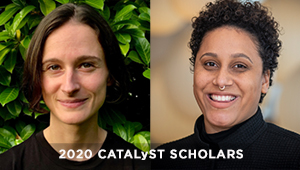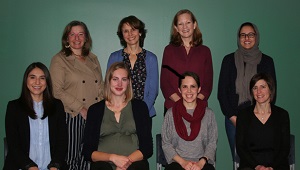CATALyST launches new round of scholar admissions

CATALyST scholars Linnaea Schuttner, Maggie Ramirez, and Yates Coley
KPWHRI’s K12 scholar program is accepting letters of interest from early-career scientists to train in learning health systems research
Health systems face many challenges in consistently delivering high-quality, safe, patient-centered, equitable, and affordable care. In the past year, the pandemic and ensuing economic crisis have stressed health systems to the brink and have brought a heightened focus on undoing systemic racism in health care and reducing health inequities. The health systems most capable of meeting these daunting challenges are learning health systems (LHS) — those that actively engage in real-time learning, drawing on the latest evidence, relevant data, and the engagement of stakeholders, including patients, clinicians, and health system leaders. Through partnerships between research and care delivery, LHS research delivers not only generalizable scientific knowledge but also meaningful health system change.
The CATALyST K12 Learning Health Systems scholar program announced this week that 2 new scholar positions are available, both with a start date of Sept. 30, 2021. Based at Kaiser Permanente Washington Health Research Institute (KPWHRI), CATALyST trains early-career scientists in the competencies of LHS research. The 2 selected scholars will have 75% protected time for customized mentorship and training, with the goal of securing independent funding by the end of the 2-year program. These new scholars will join current CATALyST scholars in interactive and didactic learning and mentored research opportunities. Funded by the Agency for Healthcare Research and Quality and the Patient-Centered Outcomes Research Institute, CATALyST is 1 of 11 Centers of Excellence around the United States supporting capacity development in LHS sciences.
“Researchers who are embedded in health systems, partnering with clinicians and leaders to address their most pressing concerns, have the potential to greatly accelerate the transformation of health care and improve care for patients,” says Paula Lozano, MD, MPH, co-director of the program and chair of the CATALyST admissions committee.
CATALyST provides scholars with a community of LHS researchers, drawing diverse, multidisciplinary faculty from KPWHRI and 3 partner institutions: the University of Washington, the Puget Sound VA, and the Floyd S. Elson College of Medicine at Washington State University.
“The COVID-19 pandemic has given us clear examples of how LHS research can lead to rapid research and evaluation to help systems provide high-quality care,” says Diana Buist, PhD, MPH, CATALyST’s other co-director. “We are excited to continue to train CATALyST scholars in how to assess the needs of stakeholders and to then develop and test innovative methods for addressing these needs.”
news

CATALyST Program selects 2 new K12 Scholars
The early-career scientists will receive 3 years of intensive training in Learning Health System research.
CATALyST

Four CATALyST scholars selected to train as learning health system scientists
KP Washington joins forces with UW, WSU, and the VA to train scientists in transforming health care.



